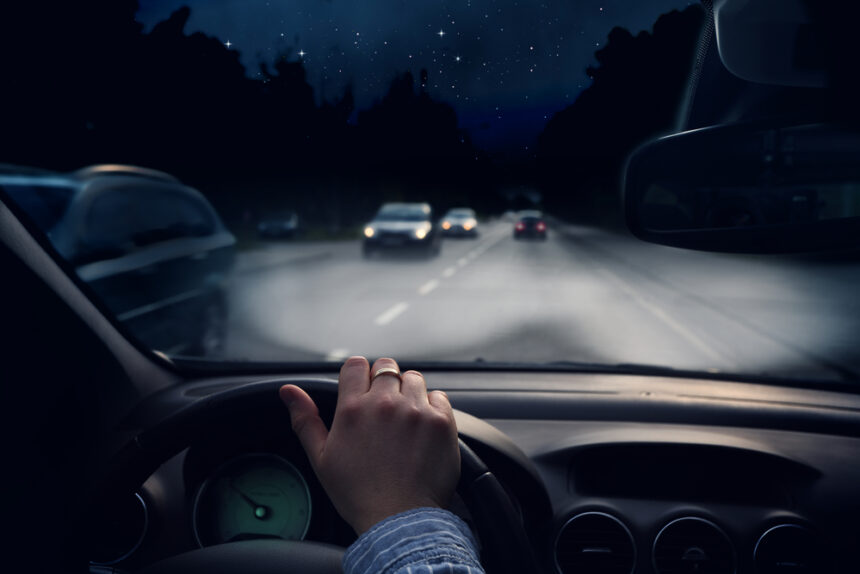Driving at night presents unique challenges that require careful consideration and preparation. Whether you’re commuting home after a long day or embarking on a nighttime journey, ensuring your safety and that of others on the road is paramount. From adjusting your driving habits to utilising technology and staying alert, here are essential tips to help you navigate dark roads confidently.
Visibility Tips
One of the most critical factors in night-time driving safety is visibility. Proper use of headlights is key: switch to dipped beams when driving in built-up areas or when following another vehicle to avoid blinding other drivers. Use full beams on unlit roads, but be prepared to dip them quickly for oncoming traffic. Keep your windshield and mirrors clean inside and out to minimise glare and ensure maximum visibility.
Adjusting Speed and Distance
Reducing your speed at night is crucial as visibility is reduced compared to daytime conditions. Slow down to give yourself more time to react to unexpected obstacles or hazards. Increase your following distance from the vehicle in front of you to account for reduced stopping distances. This extra space allows for a safer reaction if the vehicle ahead suddenly brakes or encounters an obstacle. If the accident was not your fault in this type of situation, always ensure you seek help with your claim.
Dealing with Glare
Glare from oncoming headlights can be particularly challenging at night. To reduce its impact, adjust your rearview mirror to the night-driving setting if available. If you’re being dazzled by headlights from behind, adjust your mirror to reduce glare. Try to focus on the left edge of the road to avoid the direct beam of light.
Recognising Fatigue and Managing Alertness
Driving fatigue is more common at night due to reduced stimulation and the body’s natural circadian rhythm. Watch for signs such as yawning, heavy eyelids, or drifting out of your lane. To stay alert, take regular breaks every two hours or 100 miles. Stay hydrated and avoid heavy meals before driving, as they can induce drowsiness.
Navigating Urban Areas at Night
Driving in urban areas at night comes with its own set of challenges, including reduced lighting and unpredictable pedestrian behaviour. Slow down in residential areas and near bars or clubs where pedestrians may be more likely to be crossing the road unexpectedly. Park in well-lit areas and remain vigilant when walking to or from your vehicle.
Should I Get a Dash Cam?
Do you want to upgrade the safety and security of your vehicle? Whether you’ve been in an accident or know somebody who has, you can suddenly feel vulnerable out on the road. Sometimes, you forget that crashes are a possibility. Then, it happens around you, and it can be scary.
Well, know there are many ways you can improve your car and make sure you’re protected out on the road. One thing you can add is a dash cam. There are many benefits, and you don’t have to spend a lot of money. Let’s take a closer look at why you should get a dash cam.
You Have Evidence
Are you worried that if you’re in a crash, you won’t be able to prove it was the other driver’s fault? Well, there’s a simple answer to this. Get a dashcam that’s going to record your movements. This ensures that anything that happens on the road is captured in a video. For example, you can position a dashcam at the front of your car to get footage of the road ahead. In addition, a dashcam on the rear ensures that drivers are captured behind you.
Make Other Drivers Behave
It can be obvious when you’ve got a dashcam. They can be visible in the front and rear of your vehicle. This is a good thing and it means that drivers will watch what they’re doing. They’re not going to do anything reckless because they understand they’re being recorded. So, this can help to lower the risk of an accident.
You Gain Confidence
If you’ve been in an accident before, you can be nervous getting back out onto the road. You must do everything you can to restore this confidence and make sure that you don’t shy away from driving. Indeed, having something as simple as a dashcam can boost your confidence. You know that you have some security there if you need it. It can make sure that other drivers behave around you and that you’ve got evidence if they do something wrong. So, you can feel secure that everything will be captured, and you can show your story.
Conclusion
Driving at night doesn’t have to be daunting with the right preparation and awareness. By adjusting your speed, managing glare, staying alert, and utilising modern vehicle technologies, you can significantly reduce the risks associated with night-time driving. Remember, safety is always a priority, so take these tips onboard and enjoy your journeys after dark with confidence.






